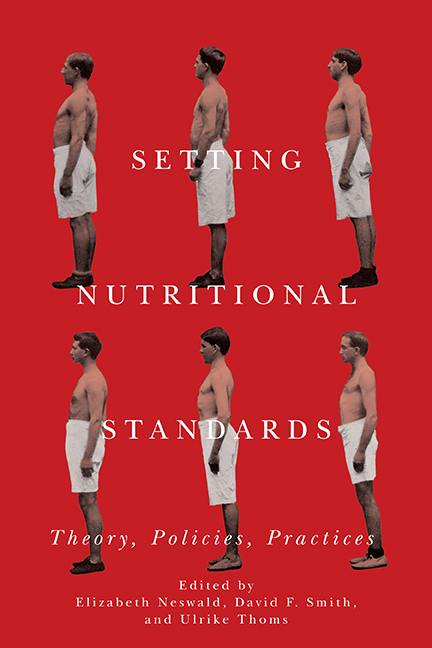Book contents
- Frontmatter
- Contents
- Acknowledgments
- Introduction
- 1 Nutritional Knowledge between the Lab and the Field: The Search for Dietary Norms in the Late Nineteenth and Early Twentieth Centuries
- 2 How Vegetarians, Naturopaths, Scientists, and Physicians Unmade the Protein Standard in Modern Germany
- 3 Of Carnivores and Conquerors: French Nutritional Debates in the Age of Empire, 1890–1914
- 4 Setting Standards: The Soldier's Food in Germany, 1850–1960
- 5 The Quest for a Nutritional El Dorado: Efforts to Demonstrate Dietary Impacts on Resistance to Infectious Disease in the 1920s and 1930s
- 6 “Not a Complete Food for Man”: The Controversy about White versus Wholemeal Bread in Interwar Britain
- 7 “Proscribing Deception”: The Gould Net Weight Amendment and the Origins of Mandatory Nutrition Labeling
- 8 When Is a Famine Not a Famine? Gauging Indian Hunger in Imperial and Cold War Contexts
- Selected Bibliography
- List of Contributors
- Index
3 - Of Carnivores and Conquerors: French Nutritional Debates in the Age of Empire, 1890–1914
Published online by Cambridge University Press: 18 April 2018
- Frontmatter
- Contents
- Acknowledgments
- Introduction
- 1 Nutritional Knowledge between the Lab and the Field: The Search for Dietary Norms in the Late Nineteenth and Early Twentieth Centuries
- 2 How Vegetarians, Naturopaths, Scientists, and Physicians Unmade the Protein Standard in Modern Germany
- 3 Of Carnivores and Conquerors: French Nutritional Debates in the Age of Empire, 1890–1914
- 4 Setting Standards: The Soldier's Food in Germany, 1850–1960
- 5 The Quest for a Nutritional El Dorado: Efforts to Demonstrate Dietary Impacts on Resistance to Infectious Disease in the 1920s and 1930s
- 6 “Not a Complete Food for Man”: The Controversy about White versus Wholemeal Bread in Interwar Britain
- 7 “Proscribing Deception”: The Gould Net Weight Amendment and the Origins of Mandatory Nutrition Labeling
- 8 When Is a Famine Not a Famine? Gauging Indian Hunger in Imperial and Cold War Contexts
- Selected Bibliography
- List of Contributors
- Index
Summary
Could meat eating change your personality? In the early nineteenth century, some French commentators argued that it could, and that meat eating could even define the collective character of a people. Julien-Joseph Virey, a pharmacist and anthropologist, proclaimed in 1813 that consuming meat had made the Romans “vigorous, energetic and bellicose,” and that the retention of Roman meat-eating habits by northern Europeans, particularly the Germans and the English, had given them the same characteristics. In the modern states of Greece and Rome, in contrast, Virey argued, the people had embraced a more vegetable-heavy diet and consequently had lost some of their “force and vigor.” Meat, Virey suggested, made for an aggressive, passionate, and forceful population, a population that could embark on the conquest of others. This message was popular throughout much of the nineteenth century, and in the 1890s most scientists still agreed that meat should hold a central place in the French diet. Yet there were also signs that experts were starting to revisit the meat question. For example, in 1893 the military doctors Louis Henri Polin and Henri Joseph Labit, in their text L'hygiène alimentaire, while stating that “meat-eating peoples are robust and strong,” also conceded that it was possible to live without meat. As they noted, “it is incontestable and demonstrated by experience: being deprived of meat is more easily supported perhaps than being deprived of vegetables.” Jean Rouget and Charles Dopter, two researchers from the Valde- Grace military hospital, went even further in their book, also called Hygiène alimentaire, which was published in 1906. For them, the ideal dietary preference found a balance between meat and vegetables. But then they added: if a vegetarian supplemented his or her diet with butter, milk, eggs, cheese, and other fats, then this diet “was eminently rational.” In other words, vegetarianism was not only a viable but perhaps in some cases a logical choice as well for French men and women in the modern age.
Why did questions arise about the role of meat in the French diet in the late nineteenth and early twentieth centuries? In the tropical colonies, as I have argued elsewhere, a belief in the need for reduced meat diets arose from fears that warm climates and the stresses of colonial life had a negative impact on French digestive systems.
- Type
- Chapter
- Information
- Setting Nutritional StandardsTheory, Policies, Practices, pp. 74 - 96Publisher: Boydell & BrewerPrint publication year: 2017

